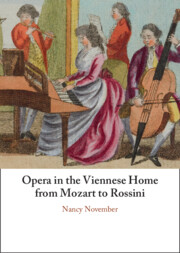Book contents
- Opera in the Viennese Home from Mozart to Rossini
- Opera in the Viennese Home from Mozart to Rossini
- Copyright page
- Contents
- Figures
- Tables
- Musical Examples
- Acknowledgements
- Introduction
- 1 Opera in the ‘Fruitful Age of Musical Translations’
- 2 Kenner und Liebhaber
- 3 Female Agency in the Early Nineteenth-Century Viennese Musical Salon
- 4 Canon Formation, Domestication, and Opera
- 5 Rossini ‘As the Viennese Liked It’
- 6 Industry, Agency, and Opera Arrangements in Czerny’s Vienna
- Bibliography
- Index
5 - Rossini ‘As the Viennese Liked It’
Published online by Cambridge University Press: 18 February 2024
- Opera in the Viennese Home from Mozart to Rossini
- Opera in the Viennese Home from Mozart to Rossini
- Copyright page
- Contents
- Figures
- Tables
- Musical Examples
- Acknowledgements
- Introduction
- 1 Opera in the ‘Fruitful Age of Musical Translations’
- 2 Kenner und Liebhaber
- 3 Female Agency in the Early Nineteenth-Century Viennese Musical Salon
- 4 Canon Formation, Domestication, and Opera
- 5 Rossini ‘As the Viennese Liked It’
- 6 Industry, Agency, and Opera Arrangements in Czerny’s Vienna
- Bibliography
- Index
Summary
This chapter explores why, in an era so strongly associated with Beethoven and Schubert, Rossini’s music was such a hit in Vienna, looking at the contribution of opera in the home to this popularity. Opera arrangements spread Rossini’s music around a wide public even before public performances were staged. Hit numbers such as ‘Di tanti palpiti’ from Tancredi were performed over and over in Vienna, in various venues and with various combinations of instruments and voices. The ‘judges of German art’ decried his work in newspaper reviews; but this did little or nothing to dampen the market’s enthusiasm. Sales of Rossini’s operas rocketed, as publishing catalogues from the era demonstrate. The popularity of Rossini, fuelled via opera arrangements, is linked to those aspects of Rossini’s music that the critics decried, especially repetition, noise, genre blurring, and theatricality. The thirst for arrangements that promoted and exacerbated these aspects is linked, in turn, to the context of surveillance and censorship in which the contemporary Viennese found themselves, and related to Habsburg politics and the Metternich System.
Keywords
- Type
- Chapter
- Information
- Opera in the Viennese Home from Mozart to Rossini , pp. 137 - 181Publisher: Cambridge University PressPrint publication year: 2024

